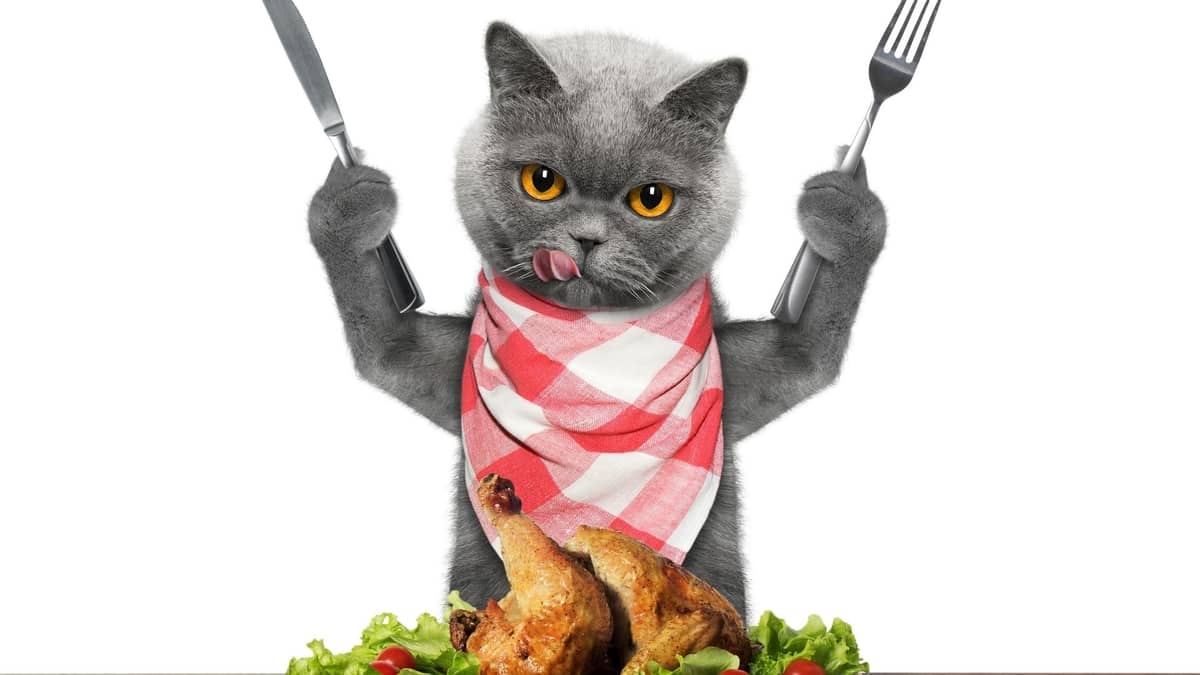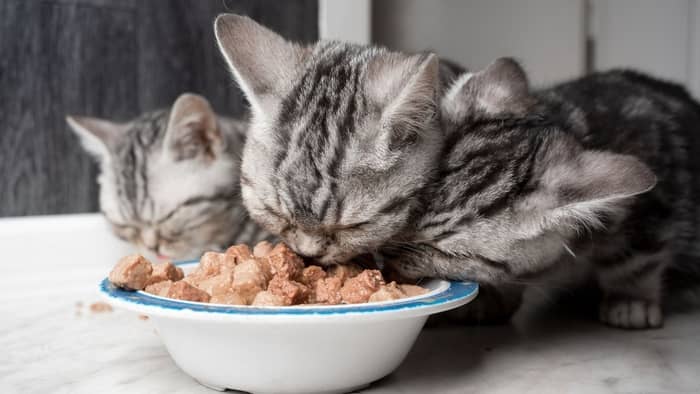Thanksgiving leftovers are a treat for everyone who gets a bite, and I love sharing with my cats! I wondered if cats can eat cooked turkey since it’s meat that is high in fat, so I set out to find the answer.
In this article, I share what I found out about this protein-packed white meat and its benefits for cats. I also share some things you need to remember when feeding it to them.
IMPORTANT: At stuffaboutcats.com, we regularly consult with licensed veterinarians and other industry experts. However, the information found on stuffaboutcats.com should not be viewed as veterinary advice. We do our best to help you better understand your cats, but the information on this blog is not a substitute for veterinary guidance.
Can Cats Eat Cooked Turkey?
Yes, cats can eat turkey meat!
Cats are meat-eaters, and turkey is a favorite. It’s one of the healthier table foods to feed your felines. As long as the turkey is fresh, cooked through, and given in moderation, it’s perfectly okay to give it to your cat.
Can Turkey Be Bad For Cats?
The answer to this question is also yes!
If you feed your cat undercooked or raw turkey, they can get sick. Raw supermarket meat is different from what your cat might have caught in the wild. It contains several harmful bacteria that can cause serious food-borne diseases like listeria and salmonella.
If you suspect your cat ate raw turkey or a piece that has gone bad, look out for these signs of listeria and salmonella:
- Appetite Loss
- Diarrhea
- Dehydration
- Fever
- Lethargy
- Vomiting
If you notice these symptoms, you should get your cat to a vet. They can offer your cat hydration medication and any other support needed.
The Benefits Of Cooked Turkey For Cats
Turkey has a lot of nutritional value. Not only can it improve your cat’s physical health, but it also enhances their mood by alleviating stress and improving their sleep. This is what turkey contains:
Protein
Turkey is packed with the protein cats need for energy and muscle gains. Protein also helps to keep their fur, skin, and heart in top condition!
Taurine
Taurine is an essential amino acid for cats, and it’s only contained in animal protein. Cats need taurine for normal eyesight, healthy heart function, uncomplicated pregnancies, optimal fetal development, and a healthy immune system.
Vitamin B6 and B12
- Vitamin B6 helps your cat maintain a healthy metabolism and immune system, and it drives the production of healthy red blood cells.
- Vitamin B12 supports your cats’ bones and nervous system while keeping their digestive system healthy.
Niacin
Niacin helps cats metabolize energy efficiently.
Selenium
Selenium wears many hats in a cat’s body and acts as an anticancer agent, helps build a healthy immune system, ensures your cat has a top-condition coat and skin, improves joint health, and has antioxidant properties.
Zinc
Zinc plays an essential role in the metabolic processes of a cat. It also helps with brain function, memory, and learning.
How To Serve Cooked Turkey To Cats?
If you want to feed your cat cooked turkey, you should keep a few rules in mind. At first, I thought anything goes, but if you’re not being safe, you can hurt your cat or make them sick.
Appropriate portions
Your cat doesn’t need the same-sized portion that’s on your plate. If you feed your cat too much turkey, they can develop digestive issues.
One ounce of cooked turkey meat at a time is more than enough for an adult cat. You should also refrain from feeding your cat turkey every day.
Feed them organs
The giblets, heart, and liver of a turkey make nutritious snacks for cats! Leave them inside the turkey (unseasoned) when cooking it and dice them up to use as cold treats later or a topper on your cat’s dry food.
Get rid of any bones
Turkey bones are a serious choking hazard. If you leave them on the meat, your cat can choke, and it might even cut their throat when they’re trying to bring it back up.
If your cat manages to swallow a bone, it can block its stomach or intestines.
Use cat safe spices
The juicy meatiness of cooked turkey will be enough to cause an explosion in your cat’s mouth, but if you really want to add some herbs, only use cat-safe ones.
Keep away from spices traditionally used with turkeys like salt, garlic powder, and onion powder.
Make cold cat treats
If you cook cube turkey, you can use it as an occasional treat throughout the week. In an airtight container, the cooked turkey will last up to 6 days at the back of your fridge.
Make wet food
You can make your own wet cat food by mixing cooked shredded turkey with a delicious homemade cat-safe sauce.
Final Words
Most cats like turkey-flavored cat food, so if you really want to treat yours, there’s nothing better than giving them the real thing! If you buy it fresh and skinless, prepare it properly, and remove anything that can harm your cat, they’ll be totally fine when eating it.
Cats need protein to survive, and giving them real meat boosts their body. White meats like turkey are an excellent source of protein, and it’s easy to make ahead of time. There aren’t many reasons not to include it in your cat’s diet!
I hope this article gave you the nudge you need to start feeding your cat-cooked turkey meat. If you’re unsure about anything, ask your questions in the comments, and other community members or I will answer them!
FAQs
How do I cook turkey for my cat?
You can cook turkey for your cat as you would for yourself, but leave out any harmful spices.
How much turkey can a cat eat?
You can feed your cat turkey in moderation. No more than one ounce of cooked turkey should be served at a time.
Is chicken or turkey healthier for cats?
Chicken has less cholesterol and more protein than turkey, making it the better choice to feed your cat.
Does Tryptophan in turkey affect cats?
Turkey doesn't contain much more Tryptophan than other meats, so it won't significantly impact your cat.
Find more information about Can Cats Eat Turkey Lunch Meat?

